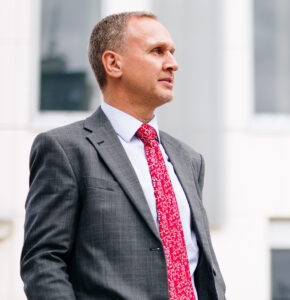Is there light at the end of the tunnel for NHS capital budgets?
Shared Agenda and Citycare Chief Executive Tim Wigglesworth looks at the subject of the NHS’s capital budgets, and whether future initiatives will provide a glimmer of hope for the organisation’s estates planners.
On one level it might sometimes feel slightly counter-intuitive when talking about annual capital budgets which run into many billions of pounds to reflect that these are too limited and constrained. A very different light shines on the equation when context and reality are factored in, with the now well-trodden ground of the highest ever levels of maintenance backlog, the increased awareness and urgency of the issues arising from RAAC, the demands of the New Hospital Programme, wholesale net zero ambitions, and constant demands for increased productivity and improved patient outcomes.
All of this runs cheek by jowl with a recent extended period of considerable under-investment of capital across the NHS, an economy which has seen significant spikes in inflation along with all of the subsequent impacts, the stranglehold of capital departmental expenditure limits (CDEL) and unintended consequences of other accounting treatments, and a political landscape under which private investment has been switched off with no sign of the tap being turned back on any time soon.
It all makes for grim reading undoubtedly, especially as local systems are required to grapple with their role in capital planning and prioritisation and balancing the sometimes competing needs of acute, community, mental health and primary care, whilst endeavouring to align these to a nationally-led programme approach whilst also struggling with limited finance and estates workforce capacity.
So what light is there ahead to provide optimism and hope? Part of the answer lies in being able to take a longer term view and having the ability to undertake meaningful strategic planning which effectively joins the dots between all parts of the health economy, and often wider to other public and community services and assets.
Whilst by far the majority of patient interactions take place in primary care, there is little evidence of a considered and coherent approach to ensuring the facilities for delivery match the requirements. Beyond this, the development of models which enable acute care settings to focus purely on those services that only they can provide, leaving others to be delivered in better suited surroundings, usually more local and community based, would give life to often discussed but seldom realised out-of-hospital strategies. Whilst there are pockets of evident good practice such as the Community Diagnostics Centre (CDC) programme, notwithstanding the resource and workforce challenges that accompany this, there are also corresponding examples of short term thinking, with delivery itself often the consequence of unplanned capital availability on a ‘use it or lose it’ basis. It has to be hoped that the merging infrastructure strategies now underway will help provide some of this focus and clarity, if only to help articulate the scale of the challenge.
With challenge comes opportunity. If we do believe that there is no magic money tree for the government to shake, it is also unlikely that the outcome of the upcoming general election is going to change this. That said, it’s hard to avoid the sense that something must give in order to break the cycle as the ever-increasing demands for capital investment won’t go away. Talk of alternative funding models persists, although again with little evidence to date for any refreshed mechanisms through which private finance could play a part in providing solutions. In the short term, making the absolute best use of existing resources and facilities is paramount, and will remain front and centre of thinking.
If you want to make the most of your funding, or look at access to sources of funding, we can help. Take a look at our Doing more with less revenue article, or get in touch to discuss how we can help you look at alternative and cost effective ways to fulfil your estates ambitions.
Tim Wigglesworth, Shared Agenda and Citycare Chief Executive


